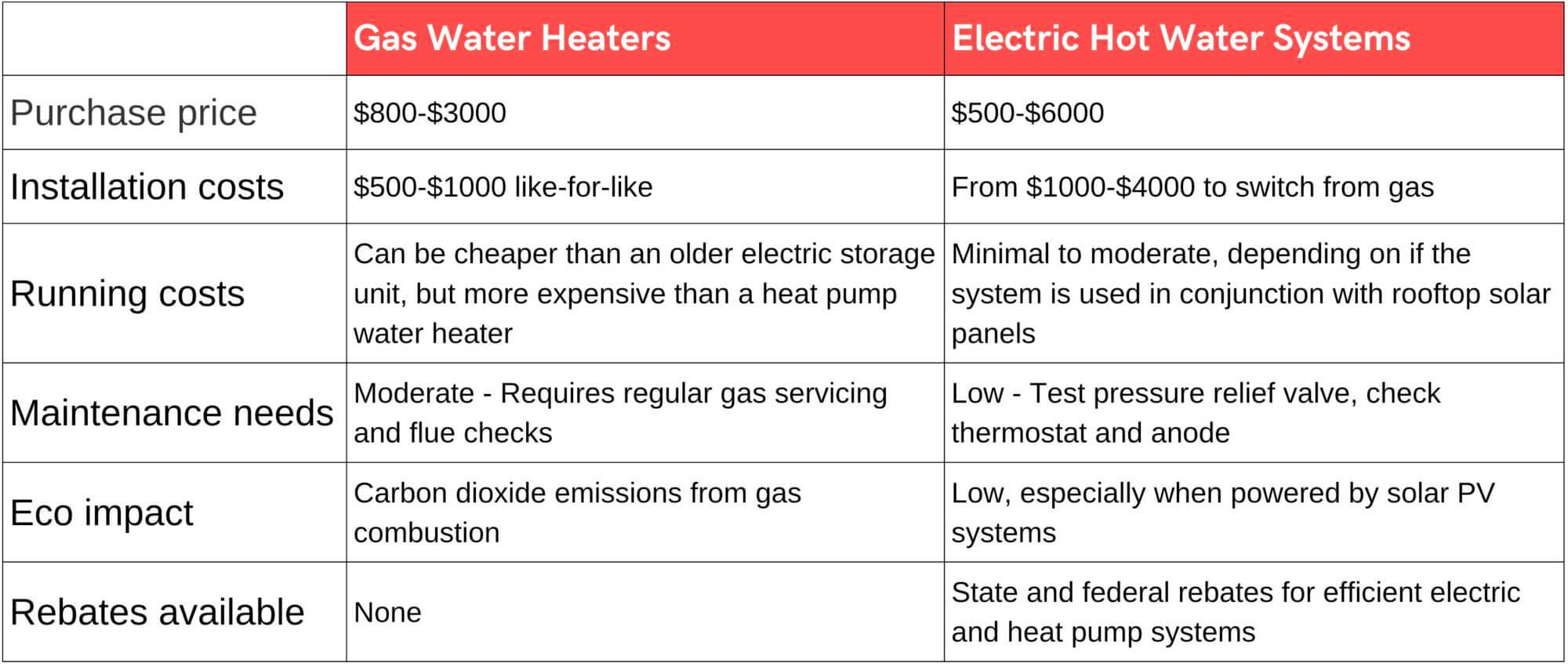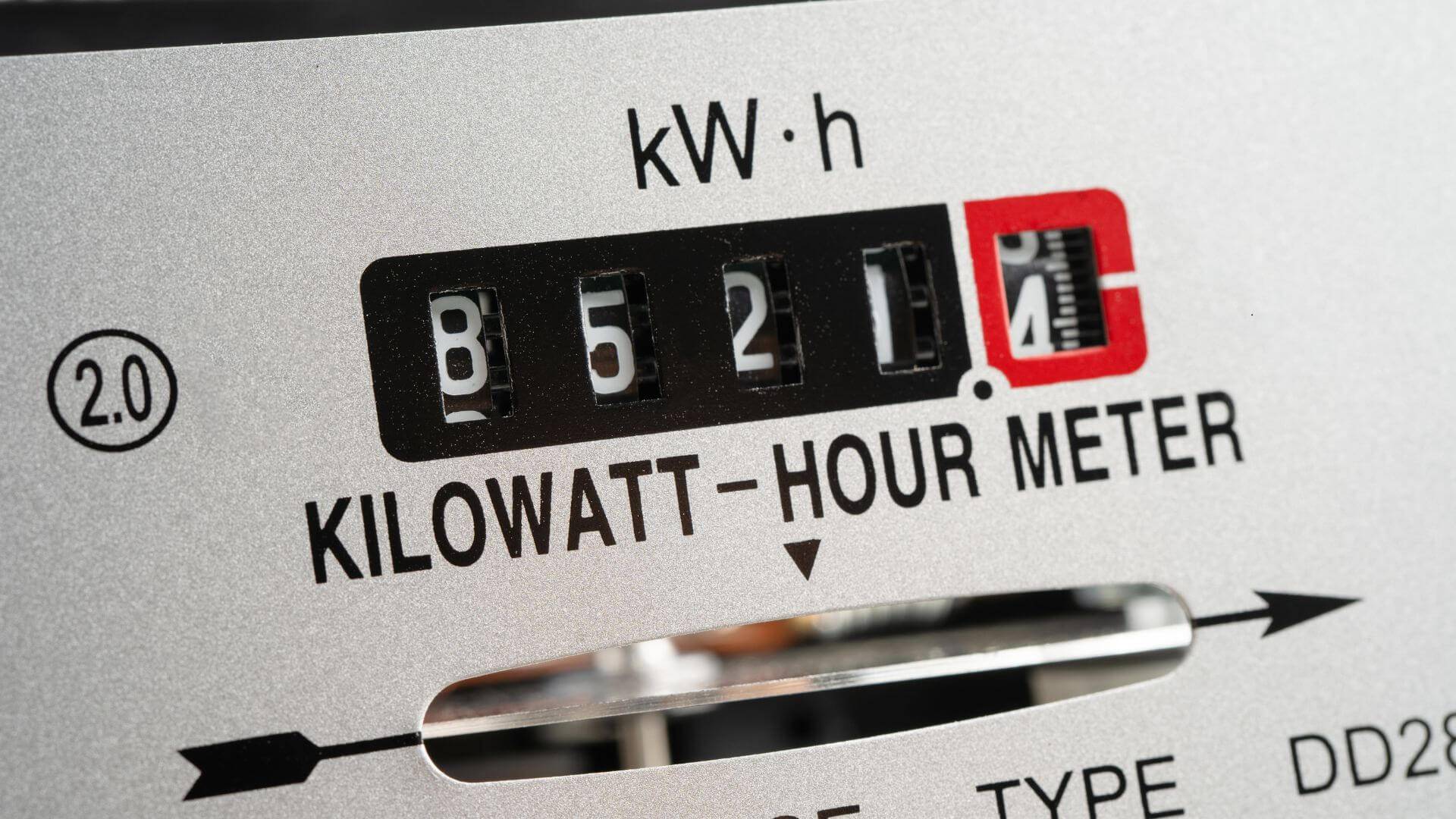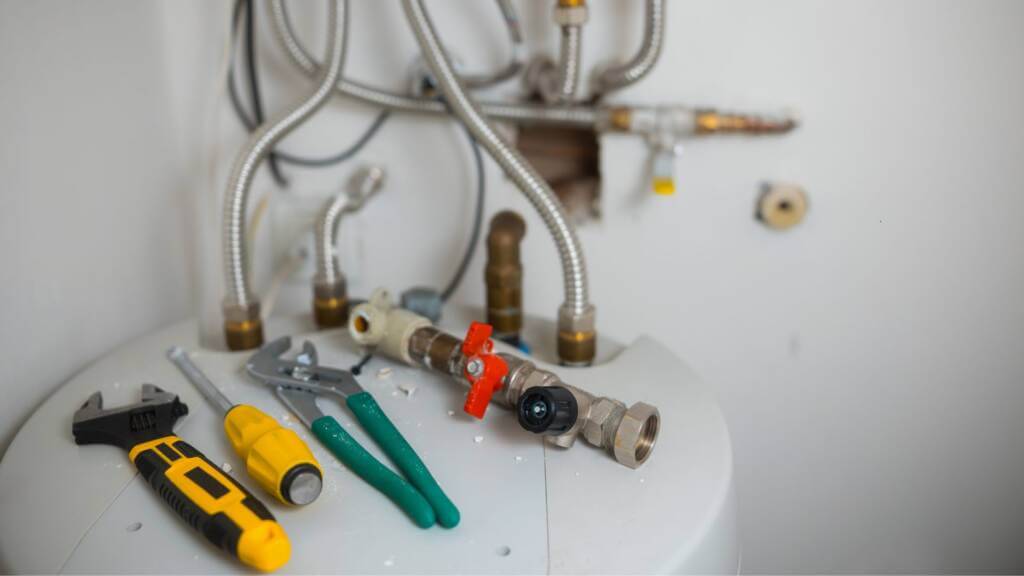From reducing greenhouse gas emissions and utility bills to improving safety and efficiency, there are plenty of reasons to replace your gas hot water system with an electric one.
With government incentives supporting the switch, there’s never been a better time to get off gas. So, let’s look at the advantages of making the change, the best type of electric system to choose, and the specific steps to take to replace your gas hot water system with an electric one.
Why Replace Your Gas Hot Water System?
Here are the top reasons to replace your gas hot water system with an energy-efficient electric system, such as a heat pump water heater.
- For lower energy bills. Household gas prices have seen substantial increases in recent years, with gas exports to blame for the end of abundant, low-cost gas for Aussie households. Although a new hot water system requires an initial investment, electric hot water systems (particularly heat pumps) can lead to significant long-term savings on energy bills.
- Gas is going. The use of natural gas is being phased out in Australia to reduce greenhouse gas emissions. Some states have already banned new connections, and federal government incentives have been implemented to support the move away from gas toward hot water heat pumps and solar hot water systems.
- Electric is generally safer. It eliminates the major risks of gas, such as carbon monoxide poisoning and gas leaks. However, like all water heaters, electric systems still require proper installation and maintenance to mitigate risks like scalding, electrical faults, and pressure-related tank failure.
- A lower carbon footprint. Electric hot water systems, particularly those used in conjunction with renewable energy, can help reduce household emissions and support Australia’s target to reach net zero.
- Heat pumps are more efficient. Heat pump technology continues to improve, with these systems saving energy by extracting heat from the surrounding air to heat water instead of relying on fossil fuels.
- Less maintenance. Electric hot water heaters generally require less maintenance and fewer safety checks than gas systems.
Comparing Gas vs Electric Hot Water Systems

Types of Electric Hot Water Systems to Consider
There are three main types of electric water heaters available, each with its pros and cons.
Electric storage water heater
An electric hot water system with a storage tank is the cheapest sort of hot water system to purchase. But, if not used in conjunction with a solar PV system, they can have high running costs. While they’re virtually silent during operation and can be installed indoors or outdoors, they take longer to reheat large volumes of water and are the least energy-efficient electric option (as they rely on direct resistance heating). Their running costs are high unless the electricity is supplied via a solar PV system or a cheaper off-peak tariff.
Heat pump water heaters
Hot water heat pumps have some of the highest upfront costs but are extremely cost-effective to run because they heat water by extracting heat from the surrounding air. They require slightly more maintenance than a storage tank system, and their performance can be slightly reduced in very cold climates. However, their energy efficiency makes them our top pick to replace a gas hot water heater.
Solar hot water systems with electric boosters
With the lowest long-term running costs, it’s hard to beat a solar hot water system, especially one with a booster to ensure reliability during poor weather. However, they do have the highest upfront costs, and their installation is more complex, especially if your roof does not receive a consistent amount of sunlight.
Step-by-Step: Replacing Gas with Electric
As well as disconnecting your gas, switching to an electric water heater may require wiring upgrades and additional circuit breakers. In most cases, you’ll require a plumber as well as an electrician to install your new system.
- The first step is to have the gas supply decommissioned. The gas appliance will be disconnected, capped and isolated at the meter, and the gas provider will have to be informed before the gas unit is removed.
- Next, an electrician should inspect your switchboard to ensure that it has enough electrical capacity, and a dedicated circuit and breaker will need to be installed.
- It’s now time for the new hot water system to be installed. Remember that a heat pump requires a location with plenty of airflow.
- The plumber will connect the cold feed and drain lines and a tempering valve may be installed if you want a controlled temperature to taps.
- The water connections and temperature and pressure relief valve will be tested, as will the wiring and current draw.
- Finally, compliance certificates will be issued. It’s important to keep these for warranty purposes.
Rebates, Incentives, and Energy Savings in Australia

To make the cost of replacing your old gas hot water system with an energy-efficient electric system more affordable, both state and federal governments have rebates available for householders.
The main financial incentive is the Small-Scale Renewable Energy Scheme, which can significantly reduce the cost of a new hot water system. Many installers ‘pre-sell’ these credits, so you’ll often see the rebate already applied to your quote.
Key Considerations Before Making the Switch
The biggest consideration before you switch from gas to electric is, by far, the cost of installation. The upfront costs of energy-efficient systems like heat pumps are another important factor to think about. However, while heat pumps do cost more initially, they will be a lot cheaper to operate in the long run.
Given the rising price of gas and the upfront cost of efficient electric systems, replacing your gas hot water system should be seen as an investment that will future proof your home.
FAQs
Can I replace gas hot water with electric myself?
You should never replace a gas hot water system with an electric system yourself as it requires disconnecting gas lines and ensuring that your switchboard has the electrical capacity to cope with the extra electrical requirements.
How long does installation take?
Installation of an electric water heater to replace your gas one usually only takes one working day, so you won’t be without hot water for too long.
What size system do I need?
What size hot water system you need depends on your household usage. That is, how many bathrooms you have, how often you wash clothes or run the dishwasher. A heat pump of 250-300L is normally suitable for the average family.
Is a heat pump worth the extra cost?
While they are initially more expensive, heat pumps are worth the extra cost because they can significantly reduce utility bills from the moment they are installed.
How much does it cost to convert gas to electric hot water?
The cost to convert from gas to electric hot water depends on the type of system you choose, the complexity of installation and the need for new electrical work.
Can you replace gas hot water with electric?
Yes, you can replace a gas hot water system with an electric one, but you may need to upgrade your switchboard.
Is it worth switching from gas to electric water heater?
The use of non-renewables like gas is being phased out in Australia. This means that it is worth switching from a gas to an electric water heater because it will help future-proof your home.
Make The Switch and Start Saving Today
Gas hot water systems are no longer the most efficient choice. Electric systems are safer and cheaper to run, so make the switch today! Visit the Same Day Hot Water Service website to view our full range of electric storage systems, solar systems and heat pump water heaters, and have one installed at your home today.


